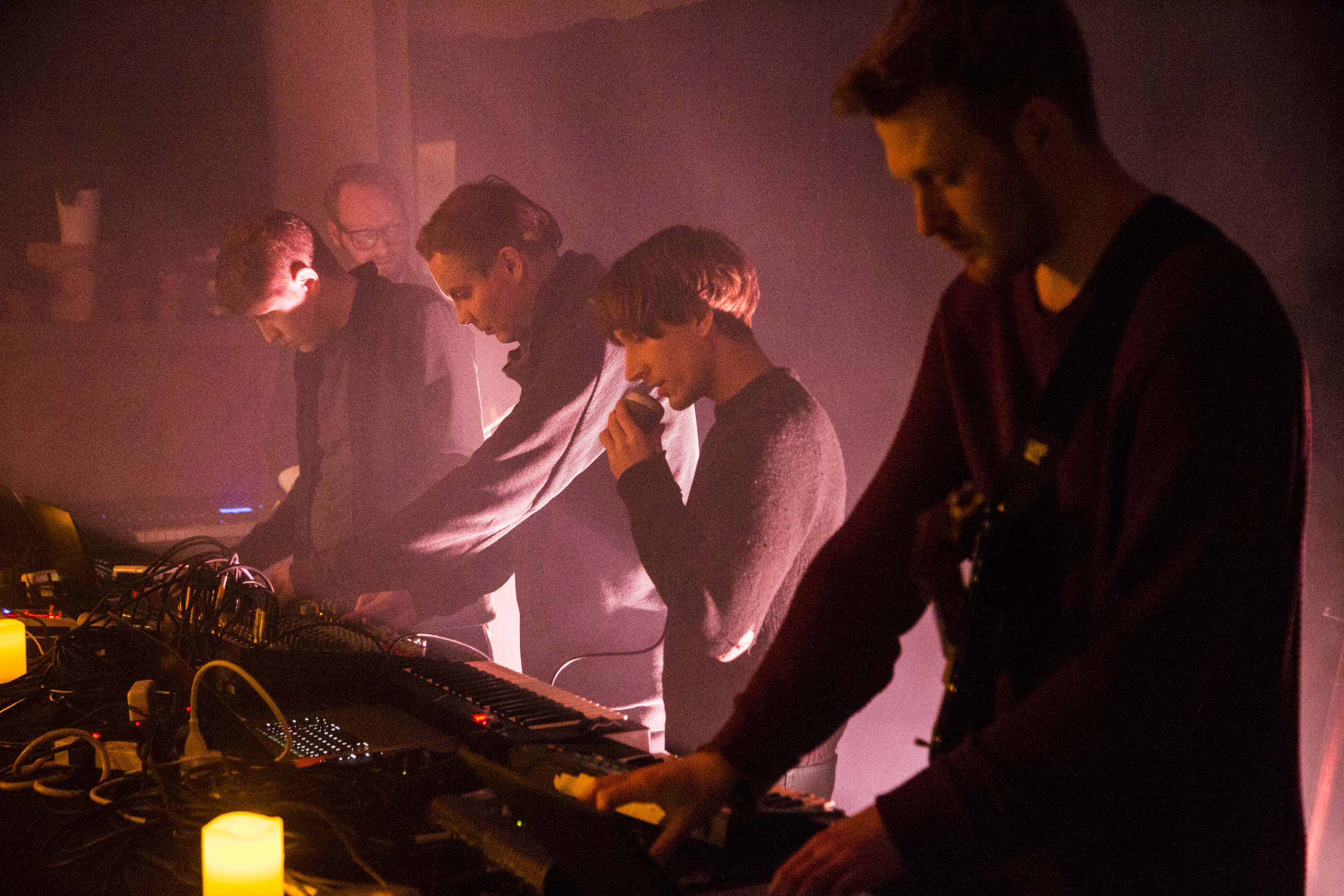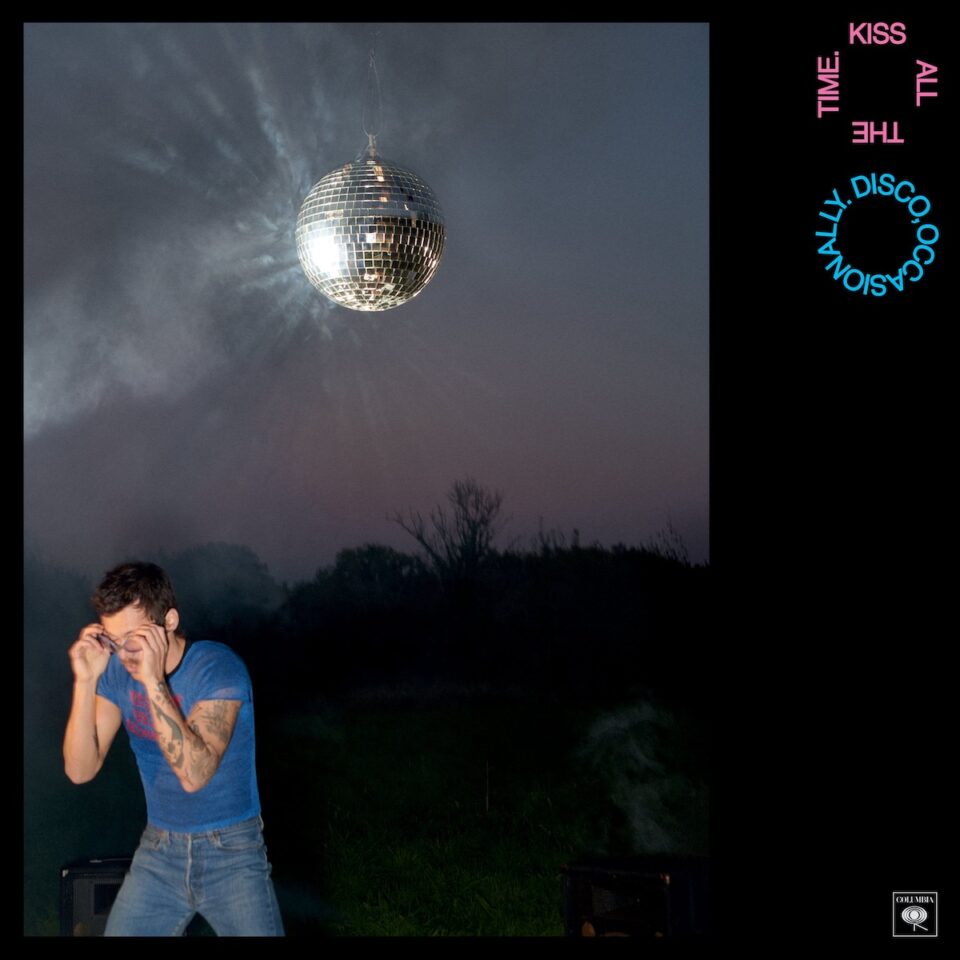I am not dressed warmly enough for this sound bath.
I’m sitting on a red Persian rug surrounded by a veritable Noah’s Ark of LA hipsterdom, listening to the live world premiere of Liminal 3, the latest addition to an ever-growing “mixtape” of ambient music produced by Jónsi of the Icelandic band Sigur Rós, his partner Alex Somers, and the group’s music director, Paul Corley. Waves of enveloping bass are washing over me as the three of them, flanked by Sigur Rós’ Georg “Goggi” Hólm on bass and Icelandic ambient/post-rock composer Kjartan Holm on guitar, work a bank of laptops, synths, mixers and patchbays, weaving together a series of new Sigur Rós tracks and remixes. It’s beautiful stuff, and the hipsters, to their credit, are listening attentively, many with heads bowed and eyes closed, vibing out to the celestial sounds.
There’s just one problem: We’re outside, and Jónsi seems to have brought some Icelandic weather with him. Actually, it’s only fifty-two degrees, but I am a thin-blooded Angeleno, so about halfway through their hour-long set, I risk breaking the spell to get up and seek out a warmer vantage point.
 I find one way in the back, in a living room that looks like the cover of a Carole King album, all Afghan blankets and throw pillows, with a magnificent grand piano as its centerpiece. One wall is open to that chilly courtyard, and from here the proceedings could be mistaken for some ancient Mayan ceremony, albeit one with lots of leather jackets and bespoke cocktails. We’re at the John Sowden House, the imposing stone residence designed by Frank Lloyd Wright’s son to look like an ancient Yucatan temple, whose distinctive textile block facades have appeared in The Aviator and America’s Next Top Model. It’s also allegedly the site of the infamous Black Dahlia murder. Earlier this year, it was purchased for upwards of $4 million by the owner of a company that makes cannabis products for pets, who now uses it to host things like this sound bath event, which I believe officially makes it the most LA house ever to have existed.
I find one way in the back, in a living room that looks like the cover of a Carole King album, all Afghan blankets and throw pillows, with a magnificent grand piano as its centerpiece. One wall is open to that chilly courtyard, and from here the proceedings could be mistaken for some ancient Mayan ceremony, albeit one with lots of leather jackets and bespoke cocktails. We’re at the John Sowden House, the imposing stone residence designed by Frank Lloyd Wright’s son to look like an ancient Yucatan temple, whose distinctive textile block facades have appeared in The Aviator and America’s Next Top Model. It’s also allegedly the site of the infamous Black Dahlia murder. Earlier this year, it was purchased for upwards of $4 million by the owner of a company that makes cannabis products for pets, who now uses it to host things like this sound bath event, which I believe officially makes it the most LA house ever to have existed.
Jónsi, Somers, and Corley began doing their Liminal sound baths last year, using them to debut one-hour segments of what is intended to be a continuous, endlessly expanding mix of ambient compositions and remixes. Typically, as at most sound baths, Liminal listeners lie on the floor, but there’s not enough room in Sowden House’s courtyard, which is dominated by a long heated pool and hot tub. So the invited audience of about 150 VIPs—which includes Eric Wareheim (who provided the event’s wine from his boutique label, Las Jaras), KCRW DJ Mario Cotto, and the guy who did A&R for Trent Reznor’s Nothing Records—sit on couches, rugs, and ottomans upholstered in white fur, or stand along the pool’s edges, their ankles shrouded in steam that rises from the heated water and mixes with white plumes from discreetly placed fog machines.
“What we like to do is make a really foggy, hazy, kind of sleepy, dreamy atmosphere—through lights, and we burn some frankincense.”
—Alex Somers
“What we like to do is make a really foggy, hazy, kind of sleepy, dreamy atmosphere—through lights, and we burn some frankincense,” Somers tells me just before the start of the event. When I suggest that the whole concept reminds me of the old “chillout” rooms from the ’90s rave scene, he agrees: “Paul and I really liked happy hardcore music and the idea of chillout rooms.”
Though it’s definitely part of the Sigur Rós universe, Liminal is meant to exist as its own freestanding project, a collaboration of equals between its three creators, only one of whom (Jónsi) is an official member of the band. But it’s also become a clever way for Sigur Rós to release new music that’s at once freed from the marketing pressures of the traditional album cycle (“It doesn’t have to be commercially viable,” Somers notes) and presented in a way that demands, or at least strongly suggests, a certain way of listening—one more attentive and meditative than we’re perhaps accustomed to in our hyper-distracted, shuffle-mode world. The third volume features the greatest amount of new Sigur Rós music yet, though much of it is presented through a filter of hazy remixes by Corley and Holm. Jónsi’s piercing, celestial vocals—most of which he renders live at Sowden House, toying with volume by waving his microphone in front of him like a magician’s wand—are every bit as stirring as they would be at a full Sigur Rós concert. But in this context, they’re greeted with hushed reverence, not cheers.
This installment of Liminal also marks the public debut of Sigur Rós music originally composed for Tonandi, the mixed reality experience the band designed in collaboration with technology company Magic Leap. In other rooms of the house, some attendees are getting private demos of the technology, which immerses you in a virtual world of alien, plant-like creatures that seem to rise up out of the floor and walls, emitting snippets of Sigur Rós’ music that change in response to the viewer’s touch and movements. Corley, who served as the project’s music director, is especially gratified that it’s finally dovetailing with Liminal, giving him and his collaborators a chance to put Tonandi’s abstract, reactive soundscapes “into a more linear song format.”
 When the sound bath is over, the event’s caterers, Vespertine, greet guests with “ceremonial cacao,” which turns out to be hot chocolate spiked with mezcal. Jónsi steps out from behind the decks and cheerfully mingles with the crowd, while Corley keeps the evening’s soundtrack going with an ambient DJ set. There’s lots of discussion about the music, but also of going somewhere to grab food; Vespertine’s Dr. Seussian hors d’oeuvres, which included things like mushroom beignets and kelp crackers sculpted to look like black orchids, were more like an idea of food than actual sustenance.
When the sound bath is over, the event’s caterers, Vespertine, greet guests with “ceremonial cacao,” which turns out to be hot chocolate spiked with mezcal. Jónsi steps out from behind the decks and cheerfully mingles with the crowd, while Corley keeps the evening’s soundtrack going with an ambient DJ set. There’s lots of discussion about the music, but also of going somewhere to grab food; Vespertine’s Dr. Seussian hors d’oeuvres, which included things like mushroom beignets and kelp crackers sculpted to look like black orchids, were more like an idea of food than actual sustenance.
It’s tempting to think that Liminal’s sound baths, in similar fashion, are like an idea of music—less substantive than actual songs. The sounds are so wispy and abstract that it’s easy for one’s attention to wander, even when one is a captive audience surrounded by hipsters in furry jackets and yoga pants. About twenty minutes into the night’s performance, I ruefully jot down in my notes, “I have the attention span of a gnat.” I am distracted by my surroundings. I regret my choice of throw pillow. I am really fucking cold.
By its very nature, Liminal will be hard for Jónsi and company to bring to the masses. You can’t do a sound bath at the Hollywood Bowl.
Therein lies a critique not of Liminal itself, but of the way I—and most people, I think—consume music in 2018. Before the advent of streaming, I used to sit with entire albums, consuming them with the same hyper-focused attention I still devote to books and TV shows. Now I seldom do. I dump things into playlists, then impatiently flip through them with the skip button, even though I’m listening to songs I myself have curated. Compared to the fleeting nature of my attention span, Liminal’s glacially unfolding tones, airy though they sometimes are, seem sturdy as cathedral walls.
By its very nature, Liminal will be hard for Jónsi and company to bring to the masses. You can’t do a sound bath at the Hollywood Bowl. The experience works best in the kind of intimate spaces the group has used so far—sound stages, private residences, the boutique music festival FORM Arcosanti. But I hope more fans, not just the VIPs, get to experience it firsthand (tonight’s event was livestreamed via Sigur Rós’ website, but as with any concert livestream, it’s a poor substitute for being there). It’s a powerful reminder that, once you remember how to give music your undivided attention, it can reward you in ways that go deeper than simple enjoyment. It can be meditative and soul-nourishing and even transformative. It makes sense that a band like Sigur Rós, whose work always seems to be reaching for some other realm of experience, have embraced this format as their preferred method of releasing new music—and in doing so, are releasing some of their most beautiful work to date. FL
For more photos, click on the gallery below.
- photo by James Lozeau
- photo by James Lozeau
- photo by James Lozeau
- photo by James Lozeau
- photo by James Lozeau
- photo by James Lozeau
- photo by James Lozeau
- photo by James Lozeau
- photo by James Lozeau
- photo by James Lozeau
- photo by James Lozeau
- photo by James Lozeau



















